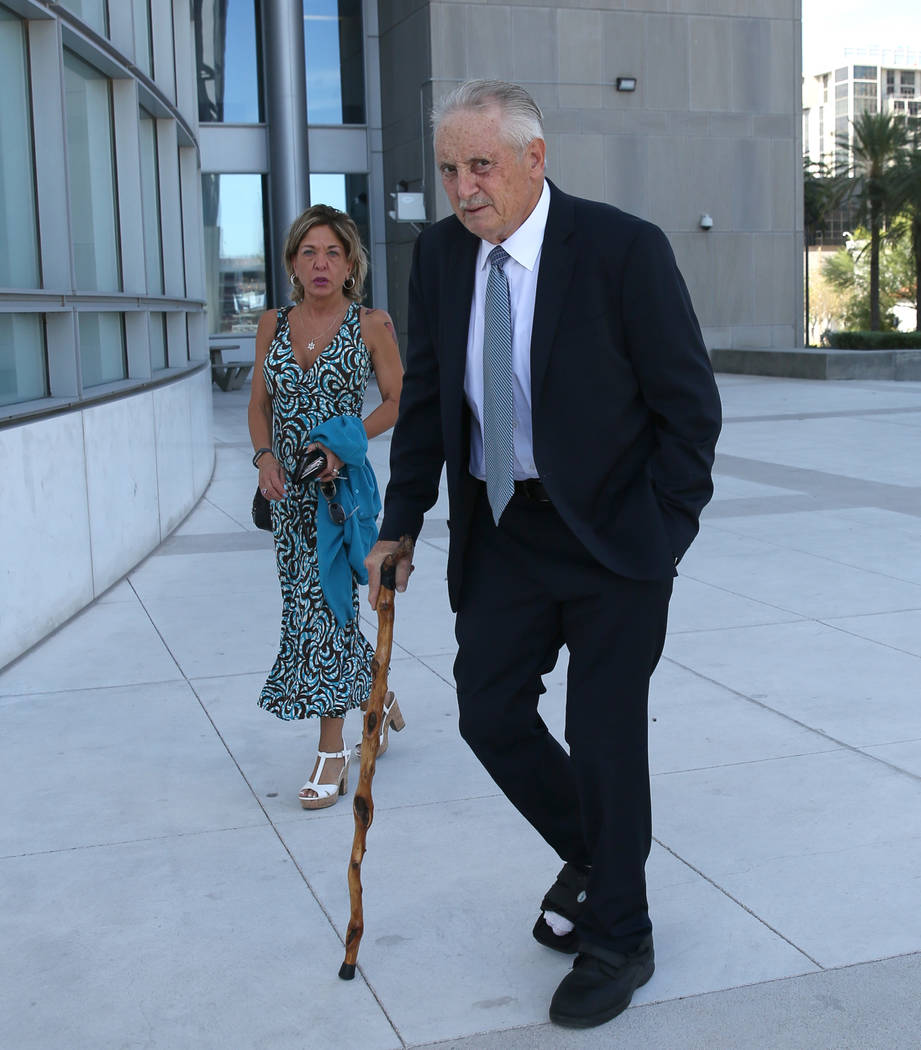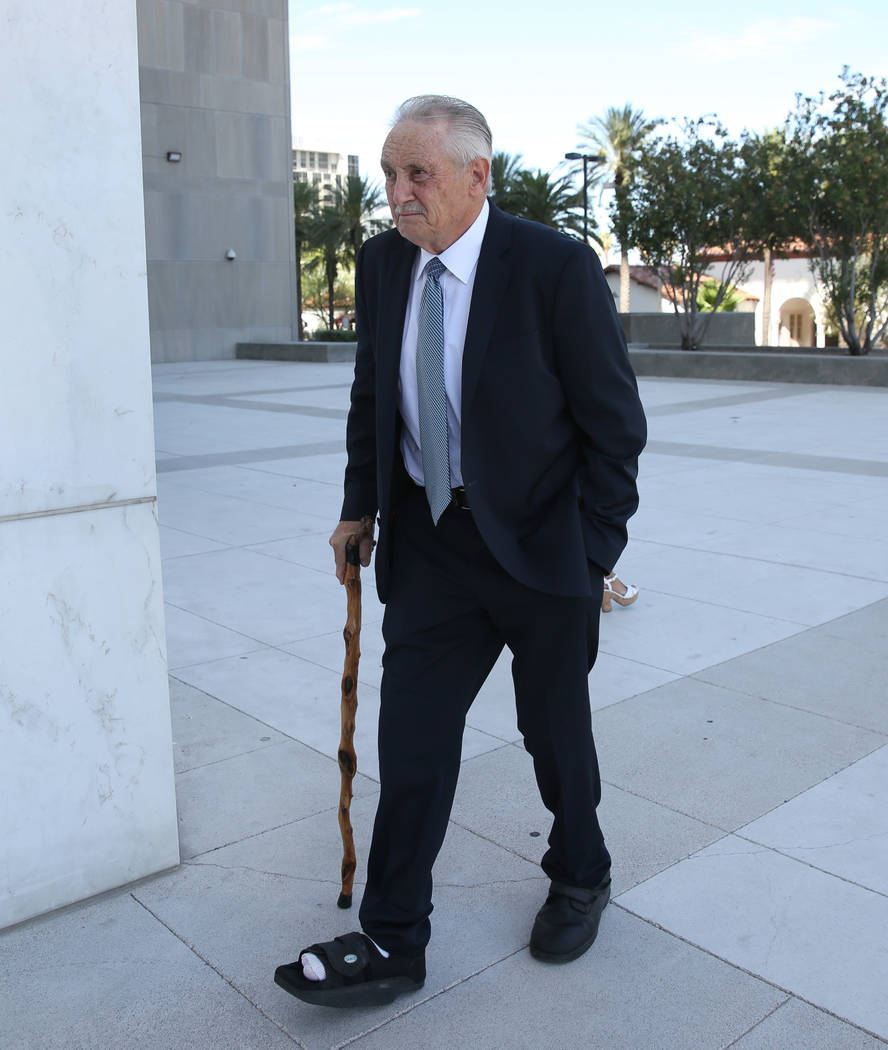Las Vegas pain doctor gets 41-month prison term in drug case
Former patients pleaded for leniency Monday on behalf of a Las Vegas pain doctor convicted of illegally distributing fentanyl to a Henderson judge who overdosed.
Dozens of patients filled the gallery behind Steven Holper, 67, and all of them said they had never met a doctor who understood and cared about their pain as well as he did.
“The best way to treat a pain patient is, unfortunately, to be a pain patient yourself,” Holper told U.S. District Judge Jennifer Dorsey before his sentencing.
Holper was sentenced to 41 months in prison after pleading guilty in December to a single count of illegally distributing a controlled substance. He initially faced seven counts of unlawful distribution of a controlled substance and 22 counts of providing a false statement relating to a health benefit program.
The charges all involved fentanyl, a synthetic opioid used for pain management that is 50 to 100 times stronger than morphine, according to the Centers for Disease Control and Prevention.
Holper prescribed his patients Subsys, a brand of fentanyl, as well as morphine, oxycodone and hydrocodone in large amounts “without a legitimate medical purpose,” his indictment states.
“All I wanted was to get them to a point where they could do home activities and work activities,” Holper said at the sentencing.
His attorney, Christopher Frey, characterized Holper as a doctor who cared deeply about his patients and was dedicated to improving their quality of life. Holper said he began prescribing Subsys for his patients after he was prescribed it himself.
Assistant U.S. Attorney Nadia Ahmed argued that as both a physician and a pain patient, Holper knew that the drugs he prescribed patients were addictive and could be fatal. She said that out of Holper’s more than 20 patients, most were prescribed far higher amounts of drugs than they needed.
“Dr. Holper is an experienced doctor and knows better and should have known better,” she said.
The 22 counts of medical fraud that were dropped stemmed from Food and Drug Administration guidelines for prescribing fentanyl. Though the charges were dropped, Ahmed brought them up before the sentencing and Dorsey took them under consideration.
“Patient A”
Holper was friends with Henderson Municipal Judge Diana Hampton for almost 20 years and treated her before she died of a fentanyl overdose, he said in an earlier court hearing.
In court proceedings and documents, Hampton is referred to as “Patient A.”
Holper told the Review-Journal after his 2018 indictment that he stopped treating Hampton and referred her to another doctor after he learned she had a drug addiction. His indictment states that he prescribed her Subsys between September 2014 and June 2015.
At his sentencing, Holper said he gave her the empty Subsys canisters for an art project.
“That’s like letting the fox into the hen house because the fox said he needed the feathers for dream catchers,” the judge said.
He gave Hampton canisters on at least six other occasions, the last one being on March 12, 2016, the day of her death, the indictment said. Hundreds of empty canisters were found around her bedroom, bathroom, workplace and vehicle, according to the indictment.
She used a tool to open Subsys canisters, according to a wrongful death lawsuit filed by Hampton’s family against Holper. Then she injected fentanyl into her arm with a syringe.
The Clark County Coroner’s office ruled her cause of death was an infection, but a contributing factor was fentanyl intoxication.
“It allowed her to get up on the bench and do her thing,” Holper said Monday, adding that it was “unfortunate” that Hampton’s Subsys use led to addiction.
Frey argued that Holper was trusting to a fault, and that “sometimes he was taken advantage of.”
In Holper’s defense
“I believe very strongly that if someone hands you a gun, and you know this gun will kill people, it’s up to you to pull the trigger,” said Kita Hurvitz, one of Holper’s former patients. She said if not for Holper, she wouldn’t be able to stand in the courtroom today. So did many others.
They each spoke in turns, some limping to the microphone or walking with canes.
Most of the patients stressed that Holper explained Subsys was highly addictive and gave careful instructions on when and how to take it.
Rea Jamal, a mother with a master’s degree in acting, said that after her first dose of Subsys, she was able to get out of bed in the morning and make breakfast for her son for the first time in two years.
“This is the only time I’ve been out of my apartment in four weeks,” she told the judge. “Dr. Holper took such good care of me, I got my life back. I was in a movie,” she said, smiling.
After a car crash that left both her and her son injured, Holper helped her with “everything,” she said, including psychiatric care, care for her son and other health issues.
Holper didn’t mind when she couldn’t pay for appointments. He once pulled out his wallet and handed her $200 to pay for her prescriptions.
Holper’s friends in the medical field also defended him.
Dr. Philip Hess said that regulation and medicine are often at odds. As patients continue to take opiates for pain medication, their tolerance rises and higher doses are needed to achieve the same effect.
Holper took patients that most physicians turned away, he said, meaning patients that needed more pain medication than others were willing to prescribe.
“There is no upper limit of opiates that is known,” Hess said.
Holper’s son, attorney Scott Holper, said that a prison term for his father was equivalent to a death sentence.
His family and Frey argued that Holper should be sentenced to probation due to his poor health, and that he shouldn’t be separated from his 3-year-old daughter.
“I don’t ask, I beg of you for leniency,” Scott Holper said. “This is an old man. He hurts, he suffers. He’s in a lot of pain.”
The state Board of Medical Examiners website lists Holper’s license as inactive, and the board will decide whether he keeps it.
After serving his sentence, Holper will be subject to three years supervised release. During that time, he will not be allowed to practice medicine.
“It’s a shame that I can’t get back into practice,” Holper said before his sentencing. “I made mistakes, and I wish to God I was in a position to treat my patients.”
Contact Max Michor at mmichor@reviewjournal.com or 702-383-0365. Follow @MaxMichor on Twitter.




















